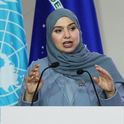The ousting of President Morsi is the second revolution that Egypt has experienced in as many years. Only this time, the deposed ruler was the country’s first ever freely elected President.
So what went wrong?As events developing in Egypt over the past year have shown, democracy is more than a box ticking exercise. The next several months and years will be critical in shaping the course of the transition.
The army has announced a roadmap calling for the temporary suspension of the constitution and the institution of a technocratic civilian government, followed by parliamentary and presidential elections.
Every plan for national reconciliation in countries that experience conflict has a similar formula. Free and fair elections feature prominently for good reason. They are instrumental in conferring legitimacy to a transition process.
But there is also a danger of fixating on elections, which risks creating a blind spot among emerging democracies.
As Egypt vividly illustrates, elections alone won’t bring about change without other crucial factors. The elections the first time around did not deliver a more representative political system–with the fatal consequences we are witnessing today. Following three decades of authoritarian rule, political organisations, especially credible opposition parties, were weak and fragmented–and they remain so.
The very strength of the spontaneous social movement that ousted Mubarak and resurfaced against Morsi may also be one of its greatest weaknesses. As the only well-organised and broad political group in the country, the Muslim Brotherhood enjoyed a considerable advantage.
The Brotherhood used electoral victory to create a view of itself as the authentic expression of Egypt’s will. Morsi’s intolerant governing style, the Brotherhood’s secretive nature, and their attempt to impose Islamist authoritarianism made a mockery of the nationwide pro-democracy movement that brought Mubarak down in the first place.
The way in which Egypt’s flawed new constitution was adopted reflects the Brotherhood’s disdain for large swathes of the population. The hastily drafted document was forced through despite angry criticism from every quarter.
One task is now vital: revising the constitution in a way that incorporates different voices in Egyptian society. That the military drew up its roadmap for reconciliation in consultation with opposition leaders, religious figures and secularists is a step in the right direction.
Fostering the development of political parties is also essential. Such efforts should try to identify democratic, secular interest-based parties as well as engaging with religious-based organisations and other entrenched interests, including the military.
The Brotherhood may have seen their ranks of supporters reduced, but they continue to be a major political force in the country. In the past Egypt’s Islamists have proven most dangerous and violent when they feel shut out of the system. There is a real danger that if they are forced underground again, the whole democratic experiment will be destabilised.
Crucial issues like religion’s role in the state, the political inclusion of minorities and the establishment of democratic checks and balances all remain at stake. The process to revise the constitution offers an opportunity to address these challenges.
It is worth keeping in mind that processes of transformation are rarely conflict-free, and these confrontations that Egypt is experiencing are the birth pangs of democracy.
The country is not back to square one. It is not the same country today as it was under Mubarak, or even two years ago. The ongoing social mobilization reveals a sophisticated, if still diffuse, citizenry prepared to act to preserve hard-won freedoms and to hold its rulers to account.
The military should beware. While it took protesters three weeks to oust Mubarak, they dispensed with Morsi in just three days. They have become a voice to be reckoned with, ready to depose a long-standing dictator, an unrepresentative elected president, and, presumably, an army, should the military decide to linger on a bit too long.












